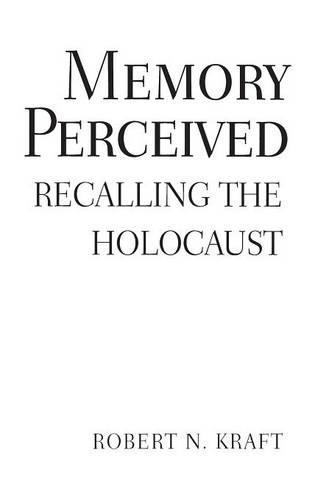
Memory Perceived: Recalling the Holocaust
(Hardback)
Publishing Details
Memory Perceived: Recalling the Holocaust
By (Author) Robert Kraft
Bloomsbury Publishing PLC
Praeger Publishers Inc
30th October 2002
United States
Classifications
General
Non Fiction
History
B
Physical Properties
Hardback
240
Description
Compelling examples from 200 hours of testimony by Holocaust survivors form the foundation of this volume on how memory responds to atrocityhow people comprehend and remember deeply traumatic experiences, and how they ultimately adapt. Depicting how the Holocaust exists in the minds of those who experienced it, this book simultaneously reveals the principles of enduring memory and makes the Holocaust more specific and immediate to readers. A synthesis of myriad testimonies allows one individual to be presented in relation to others, showing personal tragedies as well as the collective atrocity. The findings are also applied to other groups of people who have lived through extended atrocity. The volume demonstrates a Balkanization of memory, where Holocaust memories and normal memories are assigned to two, sometimes hostile, territories. Holocaust memories are not integrated into the survivor's sense of self. They stand apart as defining another self, at another time, in another place. As a contribution to psychology, this work integrates measured qualitative analysis of Holocaust testimony into the study of traumatic memory. As a contribution to oral history, it applies constructs from memory research to the understanding of Holocaust testimony.
Reviews
"Kraft's book is not only of importance to teachers and scholars interested in the Holocaust but to all who participate in the growing field of memory studies. It is a scrupulously scientific yet humane and often fascinating examination of survivor video testimonies that shows the extraordinary persistence of core memories despite trauma. Very little escapes Kraft's cogent and richly detailed descriptions of the style as well as content of these moving personal stories. There has not been a treatment as expert as this since Lawrence Langer's pioneering study."-Geoffrey Hartman Yale University
"Kraft's incredible work captures what is currently lacking in the Holocaust literature: how to represent and hold onto the atrocity, the tragedy, when all that is left is memory. Kraft inspires us to question our own relationship to the Holocaust and all traumatic experiences, through the distinct memories of survivors. The human uncertainty this history presents and the memories invoked in the reader will touch the deepest part of you. As we are all witnesses and survivors of the Holocaust, this book is a must read for everyone."-Linda G. Mills New York University
"Robert Kraft finds common threads in disparate testimonies, and using the words of the survivors themselves, provides new and revelatory insights into the way survivors remember and how memory functions and influences the past, present, and future. Memory Perceived: Recalling the Holocaust presents years of careful viewing, deep thinking, and skillful analysis. In combination with Lawrence L. Langer's Holocaust Testimonies: The Ruins of Memory, this book provides a new paradigm for understanding the impact of the Holocaust both on individuals and for society as a whole."-Joanne W. Rudof, Archivist Fortunoff Video Archive for Holocaust Testimonies Yale University
[S]ensitive and insightful....This book will take readers more deeply into the awful realm of Holocaust history.-Contemporary Psychology
[S]hould be more valuable as an insight into the workings of memory for enlightened non-professionals to see how similar are the memory processes for recalling Holocaust experiences and innocuous events. Cognitive researchers will have more of an opportunity to learn about the phenomenological experiences associated with Holocaust recollections.-Applied Cognitive Psychology
Kraft studied the video testimonies of 129 Holocaust survivors at the Fortunoff Archives at Yale University with the aim of developing "a comprehensive taxonomy of memory for atrocity." Although studies of Holocaust testimony have been undertaken from a literary perspective (Lawrence Langer's Holocaust Testimonies: The Ruins of Memory, CH, Sep'91, is the foundational book in this field), no one had attempted a comparable book from a psychological perspective. Kraft has succeeded admirably in his goal....Highly recommended. All collections.-Choice
Robert Kraft's Memory Perceived: Recalling the Holocaust is an important contribution to the psychology of Holocaust memory and the memory of trauma more generally.-Holocaust and Genocide Studies
"Sensitive and insightful....This book will take readers more deeply into the awful realm of Holocaust history."-Contemporary Psychology
"Should be more valuable as an insight into the workings of memory for enlightened non-professionals to see how similar are the memory processes for recalling Holocaust experiences and innocuous events. Cognitive researchers will have more of an opportunity to learn about the phenomenological experiences associated with Holocaust recollections."-Applied Cognitive Psychology
"[S]ensitive and insightful....This book will take readers more deeply into the awful realm of Holocaust history."-Contemporary Psychology
"[S]hould be more valuable as an insight into the workings of memory for enlightened non-professionals to see how similar are the memory processes for recalling Holocaust experiences and innocuous events. Cognitive researchers will have more of an opportunity to learn about the phenomenological experiences associated with Holocaust recollections."-Applied Cognitive Psychology
"Robert Kraft's Memory Perceived: Recalling the Holocaust is an important contribution to the psychology of Holocaust memory and the memory of trauma more generally."-Holocaust and Genocide Studies
"Kraft studied the video testimonies of 129 Holocaust survivors at the Fortunoff Archives at Yale University with the aim of developing "a comprehensive taxonomy of memory for atrocity." Although studies of Holocaust testimony have been undertaken from a literary perspective (Lawrence Langer's Holocaust Testimonies: The Ruins of Memory, CH, Sep'91, is the foundational book in this field), no one had attempted a comparable book from a psychological perspective. Kraft has succeeded admirably in his goal....Highly recommended. All collections."-Choice
Author Bio
ROBERT N. KRAFT is Professor of Cognitive Psychology and Chair of the Department of Psychology at Otterbein College.
